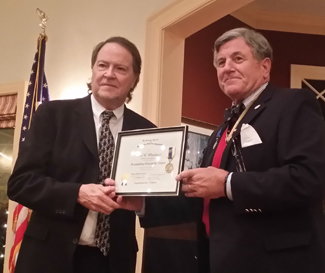On The Front Lines
John W. Whitehead Named '2015 Citizen of the Year' by the National Society of the Sons of the American Revolution, Thomas Jefferson Chapter
 Charlottesville, Va. — Constitutional attorney John W. Whitehead, president of The Rutherford Institute, has been named the “2015 Citizen of the Year” by the National Society of the Sons of the American Revolution, Thomas Jefferson Chapter, in recognition of his patriotic achievement and service. The Sons of the American Revolution seeks to maintain and extend (a) the institutions of American freedom, (b) an appreciation for true patriotism, (c) a respect for our national symbols, (d) the value of American citizenship, (e) the unifying force of e pluribus unum that has created, from the people of many nations, one nation and one people.
Charlottesville, Va. — Constitutional attorney John W. Whitehead, president of The Rutherford Institute, has been named the “2015 Citizen of the Year” by the National Society of the Sons of the American Revolution, Thomas Jefferson Chapter, in recognition of his patriotic achievement and service. The Sons of the American Revolution seeks to maintain and extend (a) the institutions of American freedom, (b) an appreciation for true patriotism, (c) a respect for our national symbols, (d) the value of American citizenship, (e) the unifying force of e pluribus unum that has created, from the people of many nations, one nation and one people.
Upon being presented with the Outstanding Citizenship Award at a private ceremony in Charlottesville, Va., Whitehead reminded listeners that the battle for freedom is not yet over. “Too often,” says Whitehead, “we forget that America began with a revolution. America was born out of the sheer grit and determination of a rebellious group of colonists. These freedom fighters stood their ground. They knew they had rights. And when those rights were systematically violated, they resisted.”
“Imagine living in a country where armed soldiers crash through doors to arrest and imprison citizens merely for criticizing government officials. Imagine that in this very same country, you’re watched all the time, and if you look even a little bit suspicious, the police stop and frisk you or pull you over to search you on the off chance you’re doing something illegal. Keep in mind that if you have a firearm of any kind while in this country, it may get you arrested and, in some circumstances, shot by police,” remarks Whitehead, whose book Battlefield America: The War on the American People paints a terrifying portrait of a nation at war with itself and which is on the verge of undermining the basic freedoms guaranteed to the citizenry in the Constitution.
“If you’re thinking this sounds like America today, you wouldn’t be far wrong,” Whitehead continues. “However, the scenario described above took place more than 200 years ago, when American colonists suffered under Great Britain’s version of an early police state. It was only when the colonists finally got fed up with being silenced, censored, searched, frisked, threatened, and arrested that they finally revolted against the tyrant’s fetters. No document better states their grievances than the Declaration of Independence. A document seething with outrage over a government which had betrayed its citizens, the Declaration of Independence was signed on July 4, 1776, by 56 men who laid everything on the line because they believed in a radical idea: that all people are created to be free. Labeled traitors, these men dared to speak up when silence could not be tolerated. Even after they had won their independence from Great Britain, these new Americans worked to ensure that the rights they had risked their lives to secure would remain secure for future generations. The result: our Bill of Rights, the first ten amendments to the Constitution. Imagine the shock and outrage these 56 men would feel were they to discover that 238 years later, the government they had risked their lives to create has been transformed into a militaristic police state in which exercising one’s freedoms is often viewed as a flagrant act of defiance. Indeed, had the Declaration of Independence been written today, it would have rendered its signers terrorists, resulting in them being placed on a government watch list, targeted for surveillance of their activities and correspondence, and potentially arrested, held indefinitely, stripped of their rights and labeled enemy combatants.”



